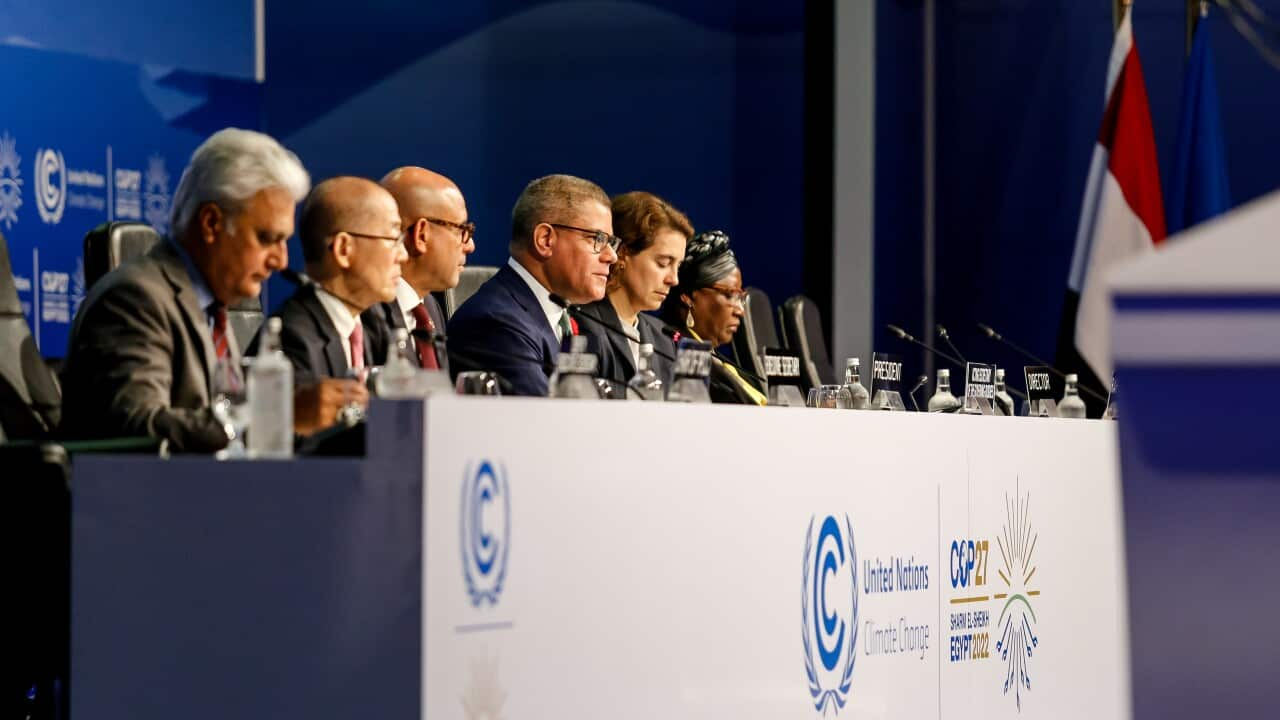Key Points
- Frankie the Dinosaur drew crowds at the COP27 climate conference in Egypt.
- A "don't choose extinction" sign was around the Utahraptor's neck.
- The prehistoric character is the UN's climate change ambassador.
A dinosaur has urged world leaders to take immediate action on climate change at COP27.
Frankie the Dinosaur, the UN's climate change mascot, roamed around the climate conference in Sharm El-Sheikh, Egypt, on Thursday.
The Utahraptor, which has an animatronic head and roaring sound effects, also carried a sign that read: "Don't choose extinction."
A UN observer who escorted the dinosaur explained Frankie was attending COP27 "to demand urgent climate action".
"This is the time that we need to move forward with all the issues around decarbonisation, around climate action, and around fossil fuel subsidy recall, we need to get around them," he said.
Frankie has been spreading his message to New York, Rwanda, India, and Bangladesh in recent months.
An animated version of the raptor was voiced by actor Jack Black when the "Don't choose extinction" campaign launched last year.

Actor Jack Black played Frankie the Dinosaur in the UN's "Don't choose extinction" campaign. Credit: UNDP
Emissions set to rise
Global carbon dioxide emissions from burning fossil fuels are on track to rise around 1 per cent this year, scientists said on Friday, warning this would make it harder for the world to avoid disastrous levels of climate change.
Released during the United Nations COP27 climate summit, the laid bare the gap between the promises governments, companies and investors have made to cut planet-warming emissions in future years, and their actions today - which cause emissions to keep rising.
Countries are expected to emit a total 41 billion tonnes of CO2 in 2022, the report from more than 100 scientists said, with 37 billion tonnes from burning fossil fuels and 4 billion tonnes from uses of land such as deforestation.
This year's increase was driven by higher oil use in transport - particularly aviation - as economies continued to reopen from lockdowns during the COVID-19 pandemic.
Emissions from burning coal increased, as countries have turned to the most-polluting fossil fuel after Russia restricted natural gas supplies to Europe after its February invasion of Ukraine, which sent global gas prices soaring.

Demonstrators participate in a Kick Big Polluters Out protest the COP27 U.N. Climate Summit on Thursday, 10 November. Source: AP / Peter Dejong
Emissions rose by 1.5 per cent in the United States and jumped by 6 per cent in India, the world's second and fourth-biggest emitters, respectively.
The UN climate science panel has said global greenhouse gases must decrease 43 per cent by 2030 to limit global warming to 1.5C and avoid its most severe impacts.
The COVID-19 pandemic caused a record drop in global CO2 emissions in 2020, but emissions are now back up to slightly above pre-COVID-19 levels.
It is difficult to predict emissions in coming years due to uncertainties around countries' longer-term response to the pandemic and Russian gas crunch, for example, whether they keep burning coal, or instead invest heavily in clean energy.
"It's complicated," said the report's lead author Pierre Friedlingstein, a climate scientist at the University of Exeter in England.
"We can't say for sure yet that emissions from China are declining in the long run... the return to use of coal in Europe, let's hope it's temporary."











